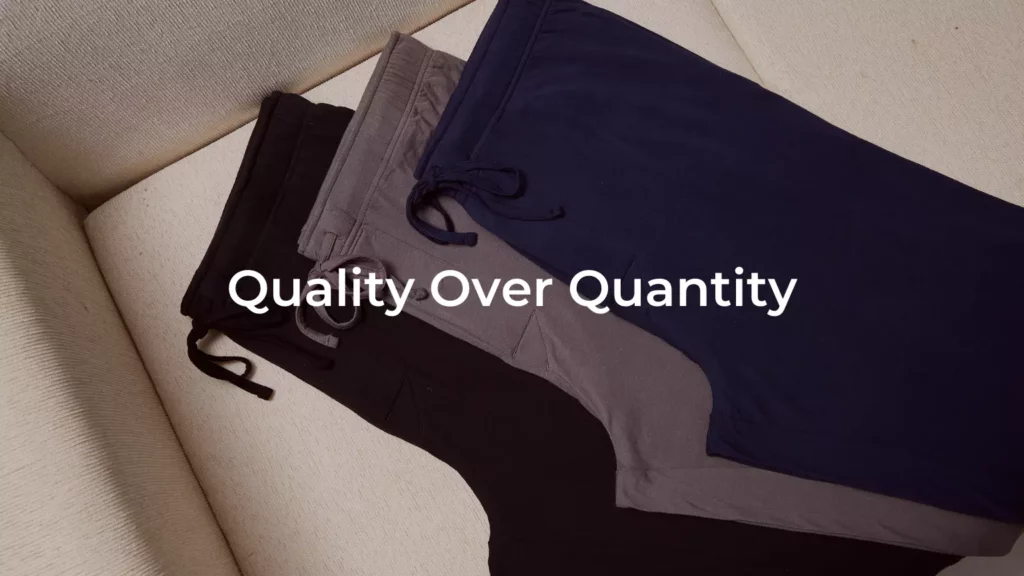9 Ways to Make Your Clothes Last Longer
DATE: April 10, 2023
Clothes, the second skin of humanity, have been with us since the beginning of civilization. From the practical to the beautiful, clothes serve many purposes beyond merely covering our bodies. They reflect our personalities, cultures, and social status. But with the ever-changing fashion industry, it’s easy to get swept up in the latest trends, leading to a throwaway culture that harms not only our wallets but also the environment. The production of clothing consumes precious resources, including water, energy, and raw materials, and often involves harmful chemicals and labour practices. Therefore, it’s essential to take care of our clothes to make them last longer and reduce our impact on the planet. In this article, we’ll explore nine ways to make your clothes last longer, from buying quality clothes to using a clothesline or drying rack to repairing your clothes and more.
- Buy quality clothes that last

When it comes to clothing, quality is key. It’s better to invest in a few high-quality pieces that will last you for years rather than constantly replacing cheap, disposable clothing. Look for clothes made from natural fibres such as cotton, bamboo, linen, or wool. These materials tend to be more durable than synthetic fibers, and they are also more sustainable. Additionally, pay attention to the construction of the garment. Look for sturdy seams and well-made buttons and zippers. Check high-quality loungewear and men’s inner wear clothing from Modern Crew, made from Micro modal fabric & Bamboo Fabric.
2. Use a clothesline or drying rack
In our modern world, many of us rely on the convenience of a dryer. However, using a clothesline or drying rack is not only better for the environment, but it can also help extend the life of your clothes. Sun-drying your clothes not only saves energy but also helps prevent damage caused by heat. Additionally, it’s important to shake out your clothes before hanging them up to prevent wrinkles and ensure even drying.
3. Avoid washing your clothes too regularly

Washing your clothes too often can cause them to wear out faster. Unless your clothes are visibly soiled, there’s no need to wash them after each wear. Instead, consider airing them out or spot-cleaning them. Not only will this extend the life of your clothes, but it will also save water and energy. Additionally, be mindful of the temperature of the water you’re washing your clothes in. Hot water can cause colours to fade and shrink fabrics, so it’s best to use cold or warm water whenever possible.
4. Wash your clothes inside out
When washing your clothes, turn them inside out. This helps protect the outside of your clothes from fading and wear caused by the washing machine. Additionally, it helps protect any prints or embellishments on your clothes. To further protect your clothes, use a gentle detergent that’s free from harsh chemicals.
5. You can choose highly durable fabric materials like Bamboo

Another way to make your clothes last longer is to choose clothing made from high-quality, durable materials such as bamboo. Using Bamboo clothing is not only soft and comfortable, but it’s also naturally antimicrobial, which means it helps prevent the growth of bacteria that can cause odour and stains. You can use bamboo fabric for your daily wear, e.g. Modern Crew premium men’s vest is made from a mix of Bamboo fabric and cotton fabric, and Modern Crew premium men’s loungepants / men’s pyjamas are made from Bamboo fabric. Additionally, clothing made from bamboo is sustainable since it consumes fewer natural resources to grow and requires much less water than cotton crops.
6. Learn to Repair Your Clothes
In today’s world, where consumerism is at its peak, it is easy to discard clothes that are slightly damaged or torn. However, learning to repair your clothes can significantly increase their lifespan. You don’t need to be a sewing expert to fix a simple tear or a missing button. Basic sewing skills such as hemming, stitching, and patching can go a long way in extending the life of your clothes. You can use online tutorials or take a sewing class to improve your skills. Additionally, investing in a basic sewing kit that includes a needle, thread, scissors, and a thimble can help you tackle small repairs as soon as they occur, preventing further damage to your clothes.
7. Know Your Fabric Ironing

Ironing your clothes may seem like a mundane task, but it can have a significant impact on the longevity of your clothes. It is essential to know your iron and its settings to avoid damaging your clothes. Always check the label on your clothes for ironing instructions, including the appropriate temperature setting. For example, silk and wool fabrics require low heat, while cotton and linen can withstand higher temperatures. Additionally, always ensure that your iron is clean to prevent staining your clothes. Regularly clean the iron plate by wiping it with a damp cloth or using an iron cleaning product.
8. Buy Better Hangers and Don’t Hang on Nails
Lastly, investing in good quality hangers can make a significant difference in the lifespan of your clothes. Wire hangers, for example, can damage the shoulders of your clothes and cause them to lose their shape over time. Instead, opt for wooden or padded hangers, which are gentler on your clothes. Additionally, avoid hanging your clothes on nails or hooks as they can cause tears or stretching in the fabric. If you don’t have enough space in your closet, consider using an over-the-door hanger or a garment rack. Finally, always hang your clothes properly, ensuring that they are not bunched up or overcrowded, which can lead to wrinkles and damage to the fabric.
Summary

In conclusion, taking care of your clothes is not only good for your wallet but also for the environment. By following the ways mentioned above, you can significantly extend the life of your clothes, reducing the need to buy new clothes and decreasing the amount of textile waste that ends up in landfills. Buying quality clothes, using a clothesline or drying rack, avoiding washing your clothes too regularly, air drying your clothes, washing your clothes inside out, using high durable raw materials like bamboo, learning to repair your clothes, knowing your iron, and buying better hangers are all simple yet effective ways to make your clothes last longer. By making a conscious effort to care for your clothes, you can contribute to a more sustainable and eco-friendlier world.



